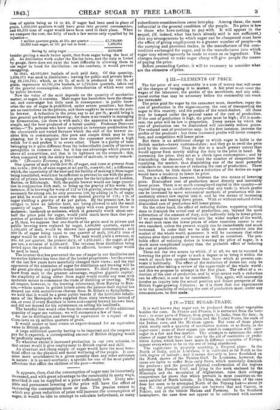§ III.—ELEMENTS OF PRICE.
The fair price of any commodity is a sum of money that will cover all the charges of bringing it to market. A fair price must cover the wages of the labourers, the profits of the merchants, and any addi- tional outlay that may be necessary before the commodity can reach the consumer.
The price paid for sugar by the consumer must, therefore, repay the cost of production in the sugar-country, the cost of transporting the sugar to this country, and the profits of the retail-dealers. All these may be lumped under the general name of the cost of production. If the cost of production is high, the price must be high ; if it is mode- rate, the price will be low in proportion. Every means by which the cost of production can be diminished will inevitably reduce prices. The reduced cost of production may, in the first instance, increase the profits of the producer ; but these increased profits will invite competi- tion, and competition will lower price. But there is an additional charge to which sugar is liable in the British market—heavy customs-duties ; and they go to swell the price paid by the consumer. They do this to a much greater extent than would appear from merely adding the duty to the price in bond. By increasing the price, they act as a check upon consumption ; and by diminishing the demand, they limit the number of competitors for supplying the market, thus diminishing one of the most powerful stimulants to invent means of reducing the cost of production. There can, therefore, be little doubt that a reduction of the duties on sugar would have a tendency to lower its price.
There is a difference, however, between the two means of lowering price. Diminished coat of production must directly and inevitably lower prices. There is so much unemployed capital in this country—or capital bringing an insufficient return—that any trade in which profits can be increased by more economical methods of production will im- mediately attract new capital into it, and be the means of increasing competition and beating down prices. With or without reduced duties, diminished cost of production will lower prices.
On the other hand, the effect of reducing duties, supposing nothing done to diminish the actual cost of production, can, beyond the mere subtraction of the amount of duty, only indirectly help to lower prices. If we attempt to throw ourselves into the wider market of the world, we shall soon raise the lower prices of other countries nearer to our own standard, unless the present supply can be immediately and much increased. In order that we be able to throw ourselves into the market of the whole world, moreover, it will be necessary that other nations alter their systems of revenue as well as ourselves. The pro- bable effect of reducing duties in lowering the price of sugar, is a much more complicated inquiry than the probable effect of reducing the cost of production. These are the two means by which, if at all, we are to succeed in lowering the price of sugar to such a degree as to bring it within the reach of much less opulent classes than those which at present con- sume it habitually. The effect of the reduction of duties can only be estimated after taking a review of the sugar-trade of the whole world ; and this we propose to attempt in the first place. The effect of a re- duction of the cost of production, and by what means such a reduction can be effected, is next to be considered. This, again, will necessarily involve an inquiry into the actual position and future prospects of the British Sugar-growing Colonies ; as it is there that our experiments as to the possibility of reducing the cost of production must, under any circumstances, be first made.


















































 Previous page
Previous page